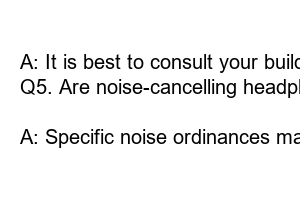층간소음 신고
Title: Report Noise Between Floors: A Guide to Peaceful Living
Introduction:
Living in an apartment complex or a multi-storey building has numerous perks, but sometimes, the downside can be the noise from neighboring floors. Whether it’s the sound of footsteps, music, or even conversations, excessive noise can disrupt one’s daily routine and lead to frustration. In this blog post, we will explore effective ways to address and report noise between floors, ensuring a harmonious living environment for everyone.
1. Understand the Importance of Reporting Noise:
Reporting noise disturbances is essential in maintaining a peaceful living atmosphere. By reporting the issue, you are not only advocating for your own well-being but also helping to foster a sense of community and respect among neighbors.
2. Identify the Source of the Noise:
To effectively report noise between floors, it is crucial to pinpoint the exact source. Take note of the time, frequency, and intensity of the noise. This information will serve as evidence when making your complaint.
3. Communicate with Your Neighbors:
Before taking further actions, it is advisable to engage in respectful communication with the neighbor(s) responsible for the noise. They may not be aware of the disturbance they are causing, and a friendly conversation can often resolve the issue amicably.
4. Follow Your Building’s Noise Policies:
Most residential buildings have noise policies in place to ensure a peaceful environment for all residents. Familiarize yourself with these policies and regulations to understand the appropriate steps to take when reporting noise. This information can usually be found in the building’s handbook or on its website.
5. Reporting to the Management:
If the noise problem persists despite your attempts to address it directly, contact the building management office. Provide them with specific details about the noise and any prior communication with your neighbors. This will enable them to intervene and facilitate a resolution.
6. Utilize Technology:
In some cases, technology can come to the rescue. Soundproofing solutions, such as acoustic panels and rugs, can help reduce the impact of noise transmission between floors. Additionally, some smartphone apps are designed to measure and record noise levels, serving as concrete evidence to support your complaint.
7. Seek Legal Assistance as a Last Resort:
If all your efforts fail to resolve the noise issue, it may be necessary to seek legal advice. Consult with an attorney who specializes in tenant rights to explore your legal options and potentially take legal action against your neighbor or building management.
Summary:
Living in close proximity to neighbors can sometimes lead to noise disturbances between floors. However, by following the steps outlined in this blog post, you can effectively address and report noise, ensuring a peaceful living environment for everyone involved. Remember to communicate with your neighbors, familiarize yourself with your building’s noise policies, and seek assistance when necessary. By taking these proactive measures, you can create a harmonious community where everyone can enjoy a calm and tranquil home.
FAQs:
Q1. How can I determine if a noise is excessive?
A: Excessive noise can be subjective, but if it disrupts your daily activities, causes sleep disturbances, or exceeds the noise policies set by your building, it is likely worth reporting.
Q2. What if my neighbor refuses to cooperate?
A: If your attempts to communicate with your neighbor fail, involve the building management to mediate the situation and help find a resolution.
Q3. How long should I wait before reporting noise?
A: There is no definite answer to this. However, if the noise is persistent and significantly affecting your quality of life, it is advisable to report it sooner rather than later.
Q4. Can I install soundproofing materials without permission?
A: It is best to consult your building management before installing soundproofing materials to ensure compliance with any rules or regulations.
Q5. Are noise-cancelling headphones effective at blocking out noise between floors?
A: Noise-cancelling headphones can help reduce noise, but they may not completely eliminate all disturbances. They are more effective for personal use in blocking out external sounds.
Q6. What laws protect tenants from excessive noise?
A: Specific noise ordinances may vary based on location. Research local housing laws or consult a legal professional to understand the tenant rights and regulations in your area.

